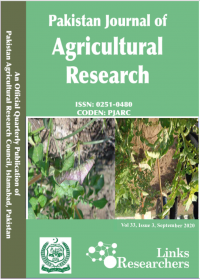Induction of Heat Tolerance in Maize through Exogenous Application of Salicylic Acid, Ascorbic Acid and Hydrogen Peroxide in a Field Study
Induction of Heat Tolerance in Maize through Exogenous Application of Salicylic Acid, Ascorbic Acid and Hydrogen Peroxide in a Field Study
Muhammad Mazhar Iqbal1*, Ijaz Ahmad2, Shahzad Maqsood Ahmed Basra3, Abu Baker Ijaz4, Zahid Hassan Tarar5, Muhammad Ansar6, Umer Iqbal7, Tayyaba Naz4, Bilquees Fatima8, Muhammad Akram9, Allah Wasaya10, Asif Iqbal11, Shakeel Ahmed Anwar12, Khalid Saif Ullah Khan13, Azeem Khalid14, Asif Aziz15 and Rashid Mehmood16
ABSTRACT
Temperature is a very important factor that affects crop yield. Maize, a monoecious plant, is adversely affected by high temperature during anthesis. Asynchronous fertilization and pollen desiccation reduce maize yield by reducing grain number and their size. Spray of hydrogen peroxide (H2O2), salicylic acid (SA) and ascorbic acid (AsA) may induce heat stress tolerance. Spray of SA, AsA, and H2O2 increased chlorophyll, relative water and nutrient contents, membrane stability index (MSI) and antioxidants activities in heat stress. Moreover, foliar application of chemicals during normal and late planting improved the grain yield by increasing both the grain number and size. Foliar spray of SA, AsA and H2O2 may induce heat tolerance by improving antioxidant activities which stabilized membrane and maintaining relative water, chlorophyll and nutrient content in ear leaves of maize during heat stress.
To share on other social networks, click on any share button. What are these?






